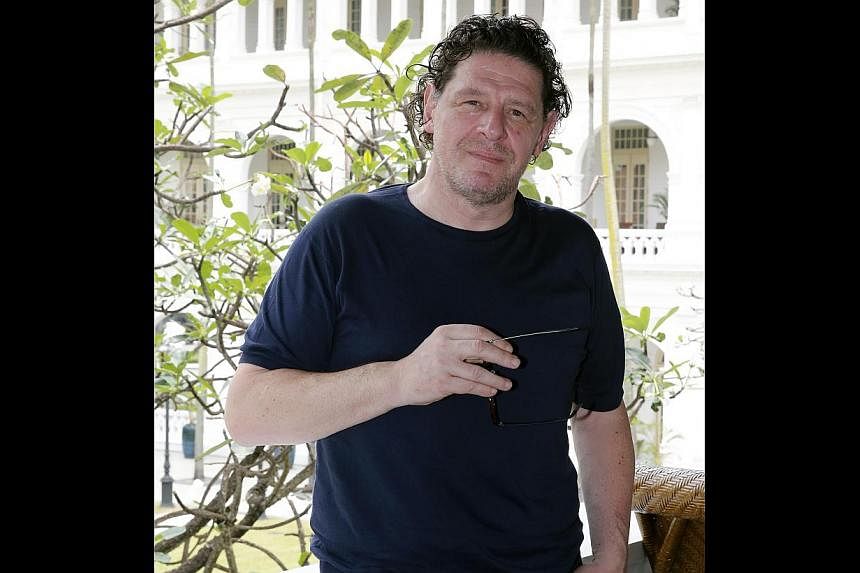While the global restaurant scene has developed over the years, British celebrity chef Marco Pierre White prefers the old-school way of doing things.
The 53-year-old's philosophies apply not only to food, but to life also.
With his old Nokia phone by his side, he tells SundayLife! that he loves staying at the Raffles Singapore when he visits. He is critical about modern kitchens and lauds the tradition of hawkers in Singapore.
He was en route to Australia, stopping over to promote his autobiography and cookbook, White Heat. It is the 25th anniversary of the book's publication and was considered ground-breaking when it was published. It showed gritty kitchen life and made a cooking career seem cool.
The reissued 192-page book has about 30 per cent more content than the previous edition, with many black-and- white photos of a younger chef White with his rockstar demeanour and signature straggly locks.
The book was written when he was in his 20s and he retired five years after achieving three Michelin stars at his eponymous restaurant at the age of 33.
Since then, the Leeds-born chef has gone on to star in TV shows. He also has various restaurant "investments", including the London Steakhouse Co.
The then enfant terrible of the restaurant scene in the United Kingdom says he does not even look at the book.
"I just sign copies of it," he says nonchalantly.
Now, the self-proclaimed "introvert", who says that is his "true nature", spends time alone in the English countryside.
He says: "Everyone evolves, but you tend to fundamentally remain the same."
His full-time job now? Thinking and observing, he says, and he is "always working" too.
So, to a certain extent, he does not seem very different from his White Heat days, as he smokes six Marlboros during the 75-minute interview with SundayLife! and is curt about having his photograph taken.
White, who has worked under the Roux brothers and counts chefs Pierre Koffman and Raymond Blanc as some of his biggest influences, also insists that his bad boy "reputation is the product of exaggeration and ignorance created by the media".
He says, with a tinge of frustration: "Do you think you could win three stars by being that kind of person? I worked very hard.
"You don't win three Michelin stars working 40 to 60 hours a week. You have to do 80 to 100 hours. People think doing 10 hours a day is working hard. What is their output? Lots of people can be at work for 10 hours, but they don't work 10 hours."
Those professional chef days are long over and he does not miss them one bit.
"That part of my world is gone and it's a different world now. It's a modern world. Things change, people change," says White, whose proteges include chefs Gordon Ramsay, Jason Atherton and Mario Batali.
And it is this modern kitchen that he remains critical about.
Repeating that he likes food served hot, he says: "Modern-day kitchens are so sophisticated and they have induction stoves. Kitchens are very cold, and therefore, food is cold.
"Go back 25 to 30 years ago, where air-conditioning wasn't so powerful and kitchens were very hot. You can smell the food, and it's hot. You walk into restaurants now, and you can't smell the food."
On his trip to Singapore, he visited Tao Seafood Asia in Asia Square where he was served shark's fin soup and crab noodles in a pot.
He says: "I like food that presents itself. The crab was the centrepiece. I like generous portions, I don't like small portions.
"Restaurants now serve 18 courses that are lukewarm. While food remains fundamentally the same over the years, it is now designed for looking, not eating. Customers are controlled to have conveyor belt cuisine."
White also says he is interested in Singapore's hawker scene, which he is not familiar with. Surprised that a big bowl of noodles would cost an average of $5 at a hawker centre, he says: "Singapore is the most expensive city, but it's £2.50 for something that is real. I've seen the hawkers, they are real. I don't like an illusion."
Immediately after the interview, he proclaims that he has to go to a hawker centre to eat from a hawker in his "last days".
While he is not often in the public eye, he is still involved as a guest judge on reality TV show MasterChef Australia, where he hopes to "inspire" contestants and viewers.
His advice for budding cooks?
"Cook food they like to eat, stay focused, disciplined, work hard. That's the principle of every line of work."
It is this emphasis on working hard that White champions, especially since it helped him to achieve the three-Michelin- starred dream in his youth.
He does not keep track of restaurant guides now and calls the World's 50 Best Restaurants list a "marketing vehicle".
"It doesn't make sense to me, it means nothing," he says. "The list is not true, in my opinion. You see restaurants go from No. 1 to 10 in a year, how can that happen? It's like watching someone juggle."
The chef, who gave up his Michelin stars, has a parting shot.
He says: "Never measure people's success by the money they make or by the Michelin stars they obtain. Let's not be blinded by fame."
White Heat is available at all major bookstores at $42.


